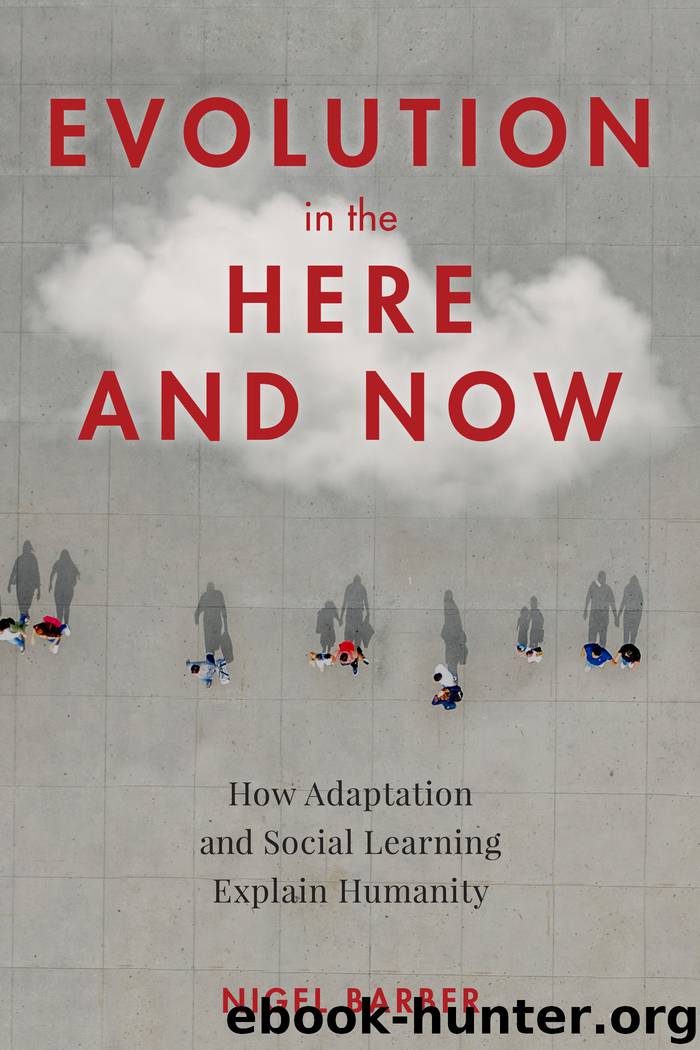Evolution in the Here and Now by Nigel Barber

Author:Nigel Barber
Language: eng
Format: epub
Tags: undefined
Publisher: Prometheus
Published: 2012-06-15T00:00:00+00:00
Agriculture and the Rise of Status
Forager societies mostly lack status distinctions. It is true that some individuals have higher status than others. The best hunters are admired by other members of the group. They are more attractive to women and enjoy more frequent extramarital flings. The shaman is also respected as a person having useful powers for intervening in the spirit world so as to improve success in the hunt. In many societies, shamans can be either male or female. Despite this, men generally have higher status than their wives, and domestic violence against women is common.
Other than these social distinctions, there is very little social hierarchy among foragers, and status differences are more earned than inherited. Their societies are said to be flat in the sense that one person is as good as another. In these subsistence societies, status distinctions are actively resisted, and anyone who becomes too big for their boots is relentlessly mocked and brought down to size.[19]
It is true that there is a headman (or head woman) who may be responsible for important decisions such as determining when to move camp. Nevertheless, their powers and privileges are limited. The headman is a servant leader who spends a great deal of time resolving disputes between other members of the group. The one sign of hierarchy is that he is permitted to take two wives (in the case of otherwise monogamous communities).
Any inequality is social and political rather than being based on differing levels of inherited wealth. Why do hunter-gatherers have no status distinctions based on personal wealth? The answer, quite simply, is that there is no wealth-based distinction because there is no viable store of wealth. What changed that divided societies up into hereditary elites, hereditary freemen, or hereditary slaves as illustrated by Egypt under the Pharaohs, which is so vividly depicted in the biblical story of Joseph (most likely fictitious)? The answer to this question is complex: different factors likely influenced the formation of status hierarchies in different societies.
One key contributor to status differences was the Agricultural Revolution. The fact that people lived in the same place permanently allowed them to acquire real property. One type of property was the agricultural land itself. Neolithic farmers from Europe’s Linear Pottery people varied in status according to archaeological research that examined the quality of grave goods buried with them.[20] Farmers living in areas having more fertile land (loess soil) were better nourished and had higher status based on the quality of their grave goods.
Analysis of the element strontium in teeth was used to assess the type of soil on which subjects were raised. Those being brought up on highly fertile loess soil had a lower strontium 87/strontium 86 ratio (these being different isotopes of the same element). Some farmers were buried with stone adzes. The overwhelming majority of individuals buried with adzes (62/63) were found to have been raised in areas having loess soil. This means that wealthier people (buried with adzes) hailed from more fertile lands that they inherited from their parents in this patrilocal society where females moved when they married.
Download
This site does not store any files on its server. We only index and link to content provided by other sites. Please contact the content providers to delete copyright contents if any and email us, we'll remove relevant links or contents immediately.
Rewire Your Anxious Brain by Catherine M. Pittman(18638)
Talking to Strangers by Malcolm Gladwell(13342)
The Art of Thinking Clearly by Rolf Dobelli(10414)
Mindhunter: Inside the FBI's Elite Serial Crime Unit by John E. Douglas & Mark Olshaker(9313)
Becoming Supernatural by Dr. Joe Dispenza(8196)
Change Your Questions, Change Your Life by Marilee Adams(7733)
Nudge - Improving Decisions about Health, Wealth, and Happiness by Thaler Sunstein(7689)
The Road Less Traveled by M. Scott Peck(7591)
The Lost Art of Listening by Michael P. Nichols(7487)
Mastermind: How to Think Like Sherlock Holmes by Maria Konnikova(7313)
Enlightenment Now: The Case for Reason, Science, Humanism, and Progress by Steven Pinker(7305)
Win Bigly by Scott Adams(7183)
The Way of Zen by Alan W. Watts(6594)
Daring Greatly by Brene Brown(6501)
Big Magic: Creative Living Beyond Fear by Elizabeth Gilbert(5751)
Grit by Angela Duckworth(5598)
Ego Is the Enemy by Ryan Holiday(5412)
Men In Love by Nancy Friday(5231)
The Laws of Human Nature by Robert Greene(5166)
